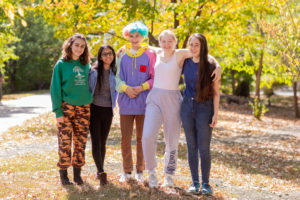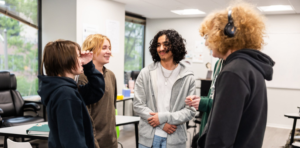Culture of Kindness
 We have all heard the term “Mean Girl.” According to a recent school study, nearly 1 in 4 girls reported being bullied during the year. This is in sharp contrast to only 17 percent of boys report being bullied. A recent AP article reports girls are 3 times as likely to experience cyber or text bullying than their male counterparts. It is clear that girl-on-girl bullying is on the rise and is impacting students on a daily basis across the country. But does it have to be this way?
We have all heard the term “Mean Girl.” According to a recent school study, nearly 1 in 4 girls reported being bullied during the year. This is in sharp contrast to only 17 percent of boys report being bullied. A recent AP article reports girls are 3 times as likely to experience cyber or text bullying than their male counterparts. It is clear that girl-on-girl bullying is on the rise and is impacting students on a daily basis across the country. But does it have to be this way?
Recently, The Sycamore School, Arlington Magazine, and Mothers of North Arlington (MONA) co-sponsored a community screening of the documentary Finding Kind. Following the screening, our school counselor facilitated a discussion with the parent and child attendees about the documentary. As the group processed the documentary, there were a few key takeaways.
Small Changes Make Big Impacts
Change can start small. Change can start with us. We begin by treating others with kindness. From the 7-11 cashier to the annoying telemarketer, we need to treat everyone we encounter with kindness.
Speak Up
When we see someone being mistreated, we need to speak up. We have the power to stop unkindness with our voice. If we all make a commitment to treating others with kindness, to say something when we see another person being mistreated, and to speak up, even if it feels uncomfortable, we will make a difference.
Model Kindness
Little kids learn to walk and talk by imitating and following adults. Similarly, kids learn how to interact with others through observing the adult interactions around them. As adults, we need to model the behaviors we want our daughters (and sons) to emulate.
- Do we talk disparagingly about other people?
- Are we critical of others?
- Do we show compassion and kindness to others?
- How wrapped up are we in our appearance, others’ perception of us, and gossip?
We must be mindful of how we act. Our actions matter as kids observe and learn from us.
Culture of Kindness at School
Some school systems are tackling these issues head-on by increasing not just anti-bullying campaigns but also implementing soft skills training. For example, the Bellevue school district in Washington has implemented an award-winning Social Emotional Learning (SEL) Initiative that teaches self-awareness, self-management, social awareness, relationship skills, and responsible decision-making. The goal is to ensure all graduates possess interpersonal skills. Students have reported decreased instances of bullying and improved student interactions following the implementation of this unique program.
At The Sycamore School, our first core value is Respect. We are committed to promoting tolerance, kindness, and acceptance of diverse beliefs, backgrounds, and lifestyles; we emphasize empathy in our community to cultivate kindness, generosity and a forgiving spirit. We are deliberate in how we maintain our culture of kindness. We know how important it is for students to feel safe and secure at school. A student who is being bullied is spending mental energy on their social situation which will adversely impact their ability to concentrate and learn. At TSS, we address conflicts that arise in real-time. We utilize a variety of tools such as speaking individually with students, holding class meetings, and conflict resolution workshops. We recognize that conflicts will naturally arise and that we need to teach tweens and teens how to navigate those conflicts. We also realize and normalize making mistakes and teach students how to do repair work. We focus on building self-esteem, compassion, and resilience. These are skills we work on every day in tandem with our academics. Cultivating these life skills will enhance students’ ability to focus and thrive in the classroom
Creating a culture of kindness takes a commitment from schools to be diligent. We must ask ourselves and our students hard questions. We have to lean into those difficult moments with the goal to shape our youth into thoughtful, empathic, and kind adults. As parents and as educators, no matter how hard we try, we can’t provide our students with constant supervision. What we CAN do is foster trusting positive relationships with our children, so they will come to us when they experience a difficult moment. When that happens we can help them navigate that experience. Our children are watching us and following our lead. Let’s show them how to be better, act better, and expect more from themselves and others.
Be Kind.
Missed our showing? Learn more about the Kind Campaign.
Posted in:

